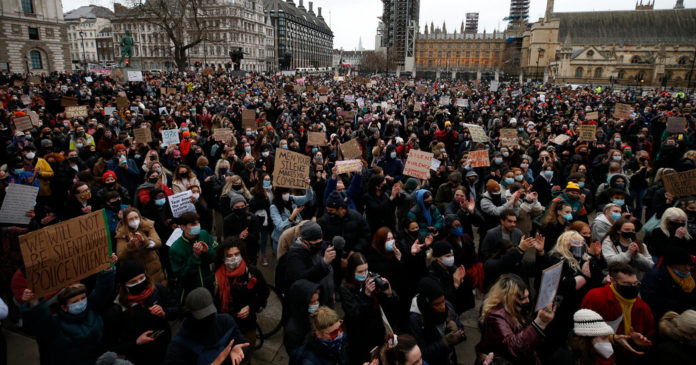LONDON — Prime Minister Boris Johnson was meeting with law enforcement officials on Monday after the London police drew widespread criticism for their handling of a vigil on Saturday to mark the killing of a 33-year-old woman.
The fallout comes as a proposed police bill that would grant more powers to control protests in Britain is set to be debated in Parliament this week and faces renewed scrutiny from opposition lawmakers and rights groups.
An investigation has been ordered into the policing of a vigil in South London on Saturday night for Sarah Everard, 33, whose killing touched off a national outcry over misogyny and violence. The vigil had been declared unlawful because of coronavirus restrictions, a move denounced by rights groups, and officers from the Metropolitan Police, the main London force, clashed with some attendees.
Mr. Johnson was scheduled to meet on Monday with ministers, senior police officers and prosecutors to discuss steps to improve safety on the streets for women and girls.
“Like everyone who saw it, I was deeply concerned about the footage from Clapham Common on Saturday night,” Mr. Johnson said, referring to the open space in South London where the vigil was held.
Speaking to reporters on Monday, he said he had confidence in Cressida Dick, the head of the Metropolitan Police, but that he supported a review into what had happened on Saturday evening. Measures in the new policing bill, he said, would increase sentences for rapists and tackle domestic violence.
Priti Patel, the British cabinet minister overseeing policing, and Sadiq Khan, the mayor of London, both called on Sunday for an independent review of policing tactics at the vigil.
Ms. Dick said on Sunday that a review would be good for “public confidence,” but resisted calls for her resignation and defended her officers, citing concerns over the coronavirus.
“Unlawful gatherings are unlawful gatherings,” she said. “Officers have to take action if people are putting themselves massively at risk.”
Ms. Everard, a marketing executive, disappeared near Clapham Common while walking home from a friend’s house on the evening of March 3. Her body was identified on Friday and a Metropolitan Police officer has been charged in her killing.
Since last week, women in Britain, shaken by Ms. Everard’s disappearance and then news of her killing, have shared experiences of harassment and voiced a long-enduring anger over violence against women at the hands of men, culminating in the vigil on Saturday night.
Women’s rights activists and lawmakers have denounced heavy-handed policing at the vigil and called it particularly upsetting given that the event had been staged to decry violence against women, and that a police officer had been arrested in Ms. Everard’s case.
“There were so many of them, it literally felt like they were against us,” Dania Al-Obeid, a woman who was arrested at the protest, said to the BBC on Monday, adding that the police had dragged her along the ground. “It was unnecessary.”
Fallout from the event and the timing of the government bill that would grant police more powers to control protests could lead to more unrest. Protesters announced plans on Monday morning for a rally outside government buildings later in the day.
Hundreds of people gathered on Sunday in a march through central London, chanting “Kill the Bill.”
Attention is now focusing on the proposed policing bill, which will be debated in Parliament this week. The bill would introduce tougher penalties for serious crimes and end a policy that releases prisoners after serving half of a fixed sentence for some crimes, in addition to giving broader authority to police protests.
Lawmakers from the opposition Labour Party have said they will now vote against the bill over concerns it would impede the rights of protesters.
“This is no time to be rushing through poorly thought-out measures to impose disproportionate controls on free expression and the right to protest,” said David Lammy, a Labour lawmaker who is the party’s justice spokesman, adding that the bill was “a mess, which could lead to lead to harsher penalties for damaging a statue than for attacking a woman.”
Source : Nytimes












